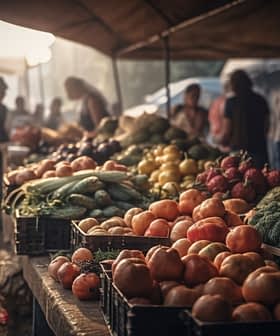A recent report by the Food and Agriculture Organization of the United Nations (FAO), warned that the Mediterranean diet is going through a “nutritional transition” away from the traditional, healthy and sustainable diet it has long been touted as.
The white paper titled “Mediterranean food consumption patterns: Diet, environment, society, economy and health,” authored by the FAO and the Paris-based International Centre for Advanced Mediterranean Agronomic Studies (CIHEAM), was presented on June 11, 2015 at EXPO Milano 2015. It pointed to the negative effects of changing diet patterns in the Mediterranean and called for action to be taken to support sustainable diets.
According to the report, this healthy, largely plant-based diet is in decline because of factors like globalization, food marketing campaigns, and changing lifestyles like a “Westernization of food consumption patterns” and the “growing participation of women in economic life.” Consumption patterns in the Mediterranean region have changed, with diets today made up mostly of meat and dairy products rather than fruits, vegetables and legumes. The effects of these changes are being felt across the region with a rise in obesity and chronic lifestyle diseases linked to bad food choices.
Traditional agricultural practices are also undergoing a transformation due to these changing dietary habits. More and more foods are imported and local crops are being replaced by “improved non-native crops,” with only 10 percent of local crop varieties remaining. The reasons given for this change in farming practices include tourism, urban development, the depletion of natural resources and a loss of traditional knowledge.
Stressing urgent policy needs, the report calls for action to be taken to prevent the further decline of the Mediterranean diet, including:
- Efforts to preserve the agro-ecosystems in the Med region
- More sustainable food system in the region
- Food security and nutrition for growing populations
- Increased understanding of how to make the med diet more sustainable
- Local case studies on how to increase production in a sustainable way
- Promotion of the continuation of this traditional diet
A three-year pilot project in the 13 countries to improve the diet’s sustainability
The Mediterranean diet is promoted as a healthy diet because of its high consumption of fruits, vegetables, legumes, olive oil, and low intake of animal protein. It is traditionally the staple diet of regions across the Mediterranean including southern Italy, Spain, Portugal, southern France, Morocco, Greece, Cyprus, and Croatia.
The fact that the diet is mainly plant-based means it uses fewer natural resources has a minimal impact on the environment. The Mediterranean diet has also been proven to promote longevity and improve cognitive function while also protecting from chronic diseases like uterine cancer and heart disease.








